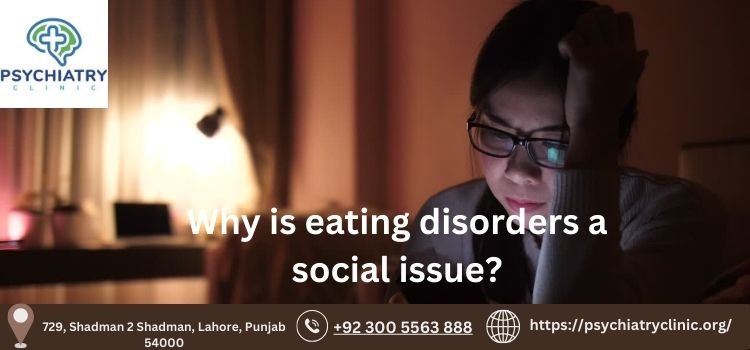Obesity as Psychological Disorder?
Posted on Tagged Obesity, Obesity as Psychological Disorder?, psychiatric issues, psychiatrist, psychiatry, Psychology
Obesity as Psychological Disorder?
Obesity is a very serious problem; one we sometimes overlook. The problems that come with it are not the ones we might be able to neglect. Obesity is not just a mere state of being; it is an actual disorder that is characterized as excessive body fat. A person is considered “obese” when their Body Mass Index (BMI) is more than average (25 kg/m^2). Many people do not see obesity as a disease but as a condition, a person has to lead themselves. In reality, the person who is obese feels significant distress due to their body weight. They are already in so much insecurity, there is no need to make them feel worse by stating offensive statements such as “Why don’t you just lose weight?” or “why are you so fat?”. Body shaming of any kind is a horrible offense. It is not benefiting anyone. If you want to help those around you, start by listening to them. Maybe they have a serious problem for which their weight is above normal. Motivate the person instead of shaming. Help them to have faith and take treatment.How to calculate BMI?
BMI meaning is body mass index. It is calculated by simply dividing your weight by your height. Your BMI would tell you if you are underweight, average, above average, or obese. BMI is usually more reliable in people from18 to 60 years of age; for younger children average BMI varies with age and gender as well. If you are an athlete or muscle builder of some kind, the average value of BMI may not be applied to you. The same goes for pregnant women and other people with such conditions. A BMI of 25-29 would be overweight and above that would be obese. Normal BMI ranges from 18.5 to 24 If the BMI is more than 30, then we call it morbid obesityOther Obesity Symptoms
Since BMI is not completely reliable for all people, other things are necessary to see if a person is obese or not. The circumference of the waist is also measured. If the waist is more than usual (35-40 m), it may be obesity. Another way to recognize obesity is by assessing the person for risks of diseases that are associated with obesity. These may include:-- Increased blood pressure and heart rate.
- High levels of glucose (sugar) in the blood.
- High levels of LDL (bad cholesterol).
- Low levels of HDL (good cholesterol).
- High levels of triglycerides (a form of fat that is stored and is not needed for use).
- Diabetes type 2
- High blood pressure
- Heart diseases including heart attack.
- Stroke
- Metabolic syndrome
- Cancer in many organs such as Uterus, cervix, ovaries, liver, rectum, pancreas and kidney, etc.
- Gynecological problems
- Sexual health issues
- Problems in the liver.
- Also, mental health issues such as the constant feeling of depression, shame, and guilt. The person may not be able to socialize anymore and not be able to perform other daily life functions such as school or job work.
How has obesity become a concern?
Obesity has become an increasing problem in this age of technology where man has to do less physical work. Since we have everything at our fingertips through cell phones and all the new smart technology, we have less and less need to move about. This may have made life easier for us all but has also changed our lifestyles. We now need more deliberate movement than ever before to continue living healthy lives. With that, we have also entered an era where food processing is not as healthy as it used to be. We are consuming artificially bred meat that contains more calories than the original. Our lifestyle has also changed our eating routines. Home-cooked food is becoming less and less by the day as families tend to dine out most of the time. This is because of the increasing number of choices to eat out and their availability all day and night; curiosity wants you to go and try each one out. The food in these restaurants is also a problem as they make you crave more and more. When the amounts of calories consumed are more than the ones we burn through activity, the risk of obesity increases.Causes of Obesity
Physical Causes The above-mentioned are universal risks that may increase the chances of obesity. There are other physical causes of obesity:-- Family history: If the family has a history of excessive fat and easy weight gain, it is most likely to be passed on to the children.
- Metabolism: People with a slow metabolism tend to gain more weight through less eating as well.
- Hormonal changes: As we grow, we are constantly facing hormonal changes in our body; if these are not regulated properly they may lead to problems such as PCO, etc. These also may increase the tendency of gaining weight.
Psychological Causes
Obesity may not be termed a mental disorder but it has many psychological causes as well. It is not referred to as a complete mental illness as it is caused by many environmental, biological, and psychosocial causes as well.- Stress eating: People tend to eat as a coping mechanism to distract themselves from their stress. This may be seen in highly anxious people (not in all as such people may not feel like eating at all). When they stress, they eat. This becomes a vicious cycle when excessive eating causes weight gain that results in more stress which is again coped with more eating.
- Eating disorders: There are some eating disorders that a person may develop due to reasons that may cause the person to eat excessively. Examples of such disorders are binge eating disorder, night eating, overeating and frequently eating high-calorie food. In a binge eating disorder, a person tends to eat huge amounts of food and feels to have no control over this behavior. They even feel significant distress due to this behavior but still are unable to stop.
- Other mental disorders: People with some kind of mental illness may develop a disturbed appetite. Examples of such disorders are depressive disorders, bipolar disorder, and schizophrenia to name a few. Due to the disorder, the person may constantly feel hungry and so eat more than normal.
- Family lifestyle: If a family has a lazy lifestyle and inactive routine, the children will adopt the same behavior. Eating habits are also learned as well. Such a lifestyle would increase the chances of obesity in every family member.
Obesity Treatment
Obesity can be treated. The treatment involves substantial lifestyle changes and may also involve therapy. The lifestyle changes would include both diet control and the addition of physical activity to everyday routine. Both things go hand in hand for effective weight loss. Change in daily life routine will not only ensure weight loss but would also reduce the chances of any future weight gain. The new strategies and diet would be hard to adopt for anyone, but if they are backed up with support from family, they would try their best. The proper routine that may be needed for a person, depending on the severity of their condition can be consulted by a doctor or a nutritionist. They would develop a whole plan for a person, keeping in check the amount of calorie intake and the amount that is burnt every day. They would also monitor a healthy rate of weight loss. By losing five to ten percent of the current weight, the person may come out of risk of associated diseases. Then they may just work on maintaining their weight if it is harder to lose more. This does not happen in a day. The process of life-changing and weight loss requires commitment. It is a slow and steady process and so requires a lot of patience. Encouragement from family members can help the person remain consistent. The best kind of support is to start changing the whole family’s lifestyle. This will make it easier to be followed and harder to break out of. The change is not to be temporary, but permanent as to prevent a relapse. Diets that allow you to lose lots of weight in a short amount of time are temporary treatments as the kind of strict diet and routine may not be easy to follow for all of one’s life. The more effective ones are the ones you gradually move to, like first, controlling portions of food, then slowly cutting off the unhealthy ones, and so on. The necessary weight loss is at least 1 to 2 pounds a week for a time till 10% of the weight is not lost. This pace is not slow; it is effective and the one recommended by all doctors. To follow up the change in lifestyle one must be completely dedicated. A healthy lifestyle would also improve the mental health of the person as a regulated routine is healthy for the mind. Here are some tips to follow the recommended routine:-- Keep a journal where you write about your routine and progress. This will bring you encouragement and a sense of accountability to yourself.
- Notice your unhealthy habits, such as eating every time you watch T.V., not getting up for small purposes such as getting a glass of water, and being a couch potato (lying down all day, doing nothing of substance), etc.
- Replace unhealthy habits with something healthier. Reduce the time you sit in front of the television, and the time you have to watch, keep a notebook where you write down interesting things you see on the channel. This would help to keep in mind food. Replacing time wasted doing nothing with a stroll in your street or park would also help.
- Find better ways to cope with stress. Engage in relaxation techniques such as meditation and yoga. These help in reducing tension and so you won’t have to worry about stress eating.
- Work towards small goals that would build up to ultimate goals. The goals can be eating only twice a day, exercising for thirty minutes a day, etc. Focusing on these small goals and then achieving those helps in boosting confidence. If one focuses on how much weight they lose, it would take time and the person may lose hope.
- Learn about what’s healthy and what’s not. The more you know, the more you grow.
- Lastly, stay consistent in your routine. Determination is key. It would be hard but it would still be worth it.
What is a healthy lifestyle?
A healthy lifestyle does not involve less eating or excessive cardio exercises, it is a normal routine that is can be adopted into everyday life. For a healthy life, there are three main important factors.- Firstly, a regulated routine that involves a fair amount of physical activity; this could be regular morning Jogs along with everyday movements such as getting up to get a glass of water, etc.
- Second is a maintained diet. A maintained diet involves routine time eating; that is not missing the daily meals of breakfast, lunch, and dinner. If we miss a meal, we tend to get hungrier than usual at odd times. A maintained diet also involves a balance of nutrition in food, too much or too less of anything is not good for health. Another important factor in regulating diet is the consumption of water; it should be not too less or too much, ideal is usually seen to be from eight to ten glasses of water daily.
- The third is regulated sleep. Research has found that sleep problems are related to excessively feeling hungry. Sleep routine is important to be maintained. Six to eight hours of sleep is sufficient for a healthy life. Also, it is important to have nighttime sleep, daytime sleep is not good for health. Too much sleep is also damaging along with less sleep.
Social Media
Related
Get The Latest Updates





